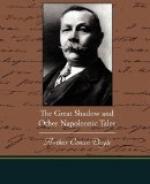And so with a nod he left us, and we began to understand that a Major who is your officer is a very different person from a Major who happens to be your neighbour in the country.
Well, well, why should I trouble you with these things? I could wear out a good quill-pen just writing about what we did, Jim and I, at the depot in Glasgow; and how we came to know our officers and our comrades, and how they came to know us. Soon came the news that the folk of Vienna, who had been cutting up Europe as if it had been a jigget of mutton, had flown back, each to his own country, and that every man and horse in their armies had their faces towards France. We heard of great reviews and musterings in Paris too, and then that Wellington was in the Low Countries, and that on us and on the Prussians would fall the first blow. The Government was shipping men over to him as fast as they could, and every port along the east coast was choked with guns and horses and stores. On the third of June we had our marching orders also, and on the same night we took ship from Leith, reaching Ostend the night after. It was my first sight of a foreign land, and indeed most of my comrades were the same, for we were very young in the ranks. I can see the blue waters now, and the curling surf line, and the long yellow beach, and queer windmills twisting and turning—a thing that a man would not see from one end of Scotland to the other. It was a clean, well-kept town, but the folk were undersized, and there was neither ale nor oatmeal cakes to be bought amongst them.
From there we went on to a place called Bruges; and from there to Ghent, where we picked up with the 52nd and the 95th, which were the two regiments that we were brigaded with. It’s a wonderful place for churches and stonework is Ghent, and indeed of all the towns we were in there was scarce one but had a finer kirk than any in Glasgow. From there we pushed on to Ath, which is a little village on a river, or a burn rather, called the Dender. There we were quartered—in tents mostly, for it was fine sunny weather—and the whole brigade set to work at its drill from morning till evening. General Adams was our chief, and Reynell was our colonel, and they were both fine old soldiers; but what put heart into us most was to think that we were under the Duke, for his name was like a bugle call. He was at Brussels with the bulk of the army, but we knew that we should see him quick enough if he were needed.
I had never seen so many English together, and indeed I had a kind of contempt for them, as folk always have if they live near a border. But the two regiments that were with us now were as good comrades as could be wished. The 52nd had a thousand men in the ranks, and there were many old soldiers of the Peninsula among them. They came from Oxfordshire for the most part. The 95th were a rifle regiment, and had dark green coats instead of red. It was strange to see them loading,




